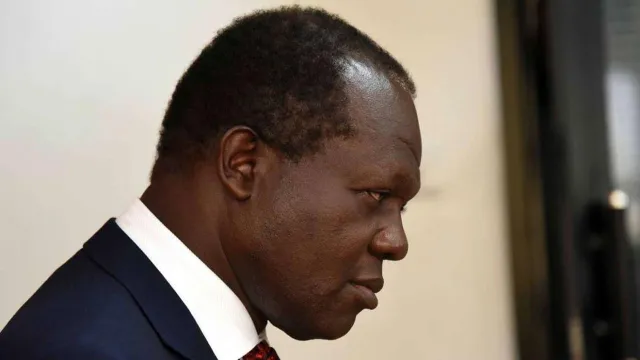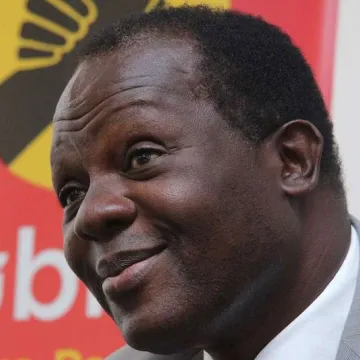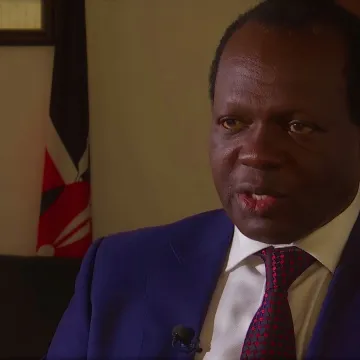Inside the Raphael Tuju-EADB battle: Part 1 of a three-part exposé

Former Cabinet Secretary Raphael Tuju.
PROLOGUE
Raphael Tuju is back in London, the city where his financial nightmare first unraveled. The former Cabinet Secretary (CS) has returned to a United Kingdom court in a desperate bid to block the East African Development Bank (EADB) from seizing and auctioning his properties. At stake is a staggering $35 million debt—now equivalent to KES4.5 billion—that threatens to strip the ex-Jubilee Party Secretary-General of his assets.
But the story doesn't begin here. It assumes a rather dramatic turn on a seemingly ordinary morning in 2021 when court-appointed receivers arrived at Raphael Tuju's property in the affluent Karen suburbs. They were not met with compliance, but resistance—armed goons and police officers stood guard, the sole mission to block the receivers from carrying out their legal duty of serving court orders.
At the center of the ensuing standoff was the property itself, which was placed as collateral for a $9.3 million loan, taken out by Tuju and his companies from the EADB.
At the time of the incident, Tuju was a powerful Cabinet Secretary in the government of former President Uhuru Kenyatta. He was, in fact, a CS without a docket, one of the few people in Kenya's history to hold such distinction, testimony to his meteoric rise within the power echelons under the Kenyatta regime. His political clout within the Cabinet was probably only rivalled by his Interior Security counterpart, Fred Matiang'i.
As President Kenyatta was being sworn into office for a second term in November 2017, EADB served Tuju, his children Mano Tuju, Yma Tuju and Alma Tuju, and his companies, Dari Limited and S.A.M Company Limited, with a demand note to settle interest instalments on the monies owed the Bank, which by that time had risen to $15,162,320.95 (equivalent to KES1.95 billion at the current exchange rates).
Shortly after, EADB filed a case in the High Court of Justice of England and Wales (Queen's Bench Division) to recover the monies lent through summary judgment. The UK Court delivered its verdict on June 19, 2019, in favour of the bank, primarily on the basis that the defendants had no defence against the claim. The bank was then at liberty to enforce its judgment in Kenya.
Defeated and facing the real prospect of losing multi-billion properties for failure to repay the bank loan, Tuju and his co-defendants swung into action. They filed a case in the Kenyan High Court to block EADB from enforcing this judgment of the English Court on the basis that they were not accorded a fair opportunity to defend against the bank's claim in the English Court.
The ensuing charade in the Kenyan courts, orchestrated and executed by Tuju, has revolved around this simple refusal to honour legal obligations but camouflaged as a quest for justice, in which the proponents play victims of injustice when, in actual sense, they have simply refused to honour their contractual obligations to repay a debt.
The unfolding saga, told here in three parts, is a classic case of a dishonest borrower, who misleads a bank to lend them money, only to flip and orchestrate legal manoeuvres designed to frustrate recovery of the outstanding borrowed funds.
PART 1: A Trip to Jerusalem
There is a popular game known as the 'Trip to Jerusalem' where a set of chairs is arranged, one less than the number of players. The music plays as the players circle the chairs. When the music suddenly stops, the players must find a chair to sit on. The player who fails to find a seat (because the chairs are fewer than the number of players) is eliminated from the contest. One chair is then removed for the next round. The game continues until all players are eliminated except the winner, who is left sitting on the last chair.
Substitute the legal process for the music and, instead of the chairs, have multiple cases filed by Raphael Tuju in Kenyan and English courts against the EADB after the latter was awarded its claim of $15,162,320.95 by the High Court of Justice of England and Wales in 2019.
But how did this dispute end up in the UK courts in the first instance? The loan agreement between Tuju and the bank expressly provided that it would be governed by English law. Such is standard practice with agreements of this nature, and the reason is simple. According to Timothy Fancourt, Queens Counsel, and a respected barrister, "English law has been said to appeal to businessmen internationally because it provides relative certainty of outcome in its application to any given factual circumstances."
In the case of Tuju and EADB, the jurisdiction of the English courts to hear and determine any disputes between the parties was and has never been in contention. In fact, Tuju vigorously defended EADB's claim against him, his children, and his companies, in essence submitting to the English legal jurisdiction. As to whether he had a strong defence is another matter altogether. Sitting as the Deputy High Court Judge, Justice Daniel QC found the defendants had none.
"I conclude that there is no real prospect of any of the defences succeeding, no real prospect of the counterclaim succeeding…," the judge deciding the matter concluded.
In defending the EADB claim, Tuju and his co-defendants had simultaneously launched a counterclaim alleging that the bank had made some representations that induced them to sign the loan agreement, which (representations) were false.
One of the alleged representations is that EADB promised to fund Phase II of the project, which involves the development of prime residential villas on a property owned by Tuju along Mwitu Road in Karen. Therefore, the defendants sought rescinding (setting aside) of the contract for misrepresentation. They also relied on the defence of set-off based on the amount sought in the counterclaim. The defendants failed on both fronts.
This is where Tuju's trip to Jerusalem begins. An attempt to appeal the Toledo decision on the grounds that the defendants were not given a fair hearing flopped. He then trains his guns on the bank, this time in Kenyan courts, in a charade that has lasted the past four years. But before delving into Tuju's attempted but futile manipulation of the judicial system to evade his legal obligations, here is a brief history of the dispute.
Sometime in 2014, Tuju approached EADB with what looked like a lucrative venture to put up a high-end hotel in Nairobi's affluent Karen suburbs. At the time, he owned a prime property along Mwitu Road in the same area. However, Tuju, a businessman who had made a fortune in the media industry, was eyeing a 20-acre property in the Tree Lane area, on which sits a century-old Victorian bungalow built by a Scottish missionary, Dr Alex Patterson. But he needed financing to acquire the property valued at hundreds of millions of shillings.
EADB agreed to lend him the money through his company, Dari Limited, with the property as security. The parties also discussed an additional loan of KES274 million to develop residential villas on the Mwitu Road property, also owned by Tuju. However, as the UK Court ruled, while a further facility was proposed and discussed, "it never reached the stage of being agreed and implemented."
In any event, EADB wired $9,197,084 (approximately KES800 million then) to Dari Limited's account through a facility agreement dated April 10, 2015. This was only part of the loan agreement, which was $9.3 million. As EADB told the UK Court, the defendants never filled in the forms for an additional drawdown of the balance of $102,916 as required by the bank's lending protocols.
In their defence filed in the UK Court, the defendants admitted that the never drawndown amount had been cancelled. Thus, the first chair in the defendants' game of legal chairs, namely the attempt to scuttle the EADB claim on the basis that it never funded phase II of the project, was gone.
When it filed its case in the English Court, the principal amount advanced to Tuju and his company Dari had escalated to $15,162,320.95 owing to accrued interest since the company first defaulted on the loan in 2016. Save for a paltry sum of $197,022 in 2016 (KES25,455,242.4), Tuju has repaid neither the principal nor the accruing interest.
Tuju offered the Mwitu Road property, another at Ngong Road in Karen, and the Tree Lane property as securities for the money to be advanced by EADB. It is important to note that EADB funded the Tree Lane property. In addition, another of his firms, S.A.M Company Limited, had offered to charge a property it owned at Masaba Road, Upper Hill, Nairobi, to secure its obligations as a guarantor to Dari. Tuju and his children—Mano Tuju, Yma Tuju and Alma Tuju—had similarly provided a guarantee to secure repayment of the loan advanced to Dari.
In the initial loan agreement, Tuju represented that the development would occur on the Mwitu Road property. However, contrary to the terms of the agreement, he unilaterally and without obtaining the lender's consent elected to develop the Tree Lane property. By altering the project site, Tuju, the bank said, had breached the loan agreement, as the specified project site constituted a material term of said agreement.
On September 18, 2015, Tuju wrote to EADB saying Dari did not need the additional loan of KES294 million and that, therefore, the Upper Hill property should be released. He gave the reason that Tree Lane had proved more popular with potential buyers than Mwitu Road, where prime residential villas were to be built. The bank declined. Tuju and his co-defendants sought to vary the "security package" comprising the three properties charged to the bank because the required value ratios had been exceeded.
The court in the UK ruled the bank was not obliged to do so.
By altering the project's location specified in the loan agreement without obtaining prior consent from the lending institution, the borrower neglected the fact that banks assess credit risks based on the specific property designated by the borrower. Unilaterally modifying the approved site constitutes a material change to the terms of the agreement, necessitating a renegotiation of the contractual provisions.
In addition, the court found that the defendants knowingly provided guarantees to Dari and that "each guarantee entered into by (the defendants) contained an acknowledgement that independent legal advice in relation to the guarantee had been taken."
The devastating defeat handed to Tuju and his co-defendants by the English High Court made any prospect of a successful appeal remote. However, after insisting on appealing and losing, it must have become crystal clear to the defendants that they were at risk of losing their prime properties if the bank proceeded to execute the judgment.
Faced with this imminent threat, the battleground quickly shifted from England to Kenya. Given the history of Kenyan courts in entertaining frivolous technicalities relied on by unscrupulous litigants hell-bent on scuttling justice by abusing the judicial system, Tuju was already plotting another scheme to stop EADB in its tracks.
Let the music play.
Upon securing judgment in its favour, EADB filed a case in the High Court of Kenya on December 31, 2019, six months after the Toledo decision, seeking the recognition, registration, and enforcement of the English court's judgment. However, Tuju objected to the proceedings on the basis that he was not given a fair hearing in the English court. This is even though he mounted a multi-pronged defence to EADB's claim. A perusal of the judgment shows the court addressed each issue the defendants raised.
This objection by Tuju in the Kenyan court, therefore, constitutes the second chair in Tuju's game of legal chairs. Having failed to convince the English court that they had a good defence to the bank's claim, the defendants relied on the argument that they had not been accorded a fair hearing, so Kenyan courts should not enforce the judgment.
Bruised by the UK verdict, Tuju saw this as an opportunity to re-litigate the issues before Judge Toledo on the Kenyan judicial platform. As fate would have it, Justice Wilfrida Okwany of the High Court of Kenya dismissed Tuju's argument. She said the Kenyan court could not sit on appeal on the decision of its UK counterpart and that its jurisdiction was limited to enforcing the foreign judgment.
Tuju had just suffered his second defeat. Essentially, the court in Kenya was telling Tuju that the judgment in favour of EADB was worth every inch of the paper it was etched on. His argument that the United Kingdom's judgment violated Article 50 of the Constitution of Kenya did not hold water.
Since then, the dispute has dragged into Kenyan courts as Tuju resists any attempts by EADB to recover the money Tuju owes. His strategy entails using technicalities to stall the process, lacking strong merits to anchor his case. Tuju has been buying time to avoid repaying the loan by frustrating all legal avenues for the bank to realise the benefits of its judgment. This includes defying court orders allowing receiver managers to take over the management of his company.
He has also been persistent in claiming, through his lawyers in the various court proceedings, that EADB breached the loan agreement by not advancing him and his company KES274 million as additional funding for his project. This despite the London court finding, upon his admission in defence, that he no longer needed the loan.
In the court, Tuju presents the image of a victim fighting perceived injustice. Outside the court, Tuju is the quintessential Machiavellian operative who is not averse to deploying barbaric tactics like hiring criminals to do his bidding. He defies court orders with impunity even as he continues to profit from property used to secure a loan he has willfully refused to pay.
He has also perfected a smear campaign against judicial officers who issue rulings against him, in a classic case of shooting the messenger. At the height of his power and influence during the Uhuru Kenyatta regime, Tuju used his connections to intimidate the courts. Using this powerful political platform, Tuju would attack judges he perceives as antagonistic to his interests. One judge, who refused to recuse themselves from the Tuju case, was curiously transferred to another station. Another one stepped aside after claims of impropriety were lodged against her.
As recently as June 2024, Tuju took his campaign against judges a notch higher when he demanded that Supreme Court judges be investigated for bias. He will not spare even the highest court in the land. Tuju refuses to accept that his game of legal chairs will soon end when he runs out of chairs to sit on.
Stay tuned for part 2 on Tuesday, December 10th, 2024, and part 3 on Wednesday, December 11th, 2024, of this captivating story.





